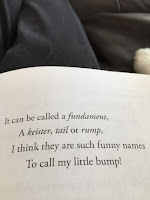 We all know kids
love CAPTAIN UNDERPANTS and the CHARLIE JOE JACKSON books. But why? And furthermore, why are these
books embraced by the reluctant reader far and wide? I propose it’s because they’re
packed with quick and engaging page turns, chapters with ample white space, and because
THEY ARE FUNNY.
We all know kids
love CAPTAIN UNDERPANTS and the CHARLIE JOE JACKSON books. But why? And furthermore, why are these
books embraced by the reluctant reader far and wide? I propose it’s because they’re
packed with quick and engaging page turns, chapters with ample white space, and because
THEY ARE FUNNY. Another book for the reluctant reader
recently crossed my path, and trust me—it will make kids “crack” a smile,
especially with a name like THE BUM BOOK. Authors Dawko and Ditz, and
illustrator Cartoon Dave promise “…piles of poopy poems, cheeky cartoons and a
butt-load of other stuff that will crack you up!” Maybe lines like this have you chuckling, or
perhaps this is not your personal choice for humor—but put your taste aside for
a moment and consider the notion that a book like this may be the key to engage an unwilling
reader. It's the perfect propaganda to win over another library attendee (insert evil-villain laughter here). Furthermore, there’s some literary merit, after all—Dawko and Ditz
include a poem on using the thesaurus (of course their goal is to look
up other ways to say “bottom” “butt” and “kiester”, but still).
Another book for the reluctant reader
recently crossed my path, and trust me—it will make kids “crack” a smile,
especially with a name like THE BUM BOOK. Authors Dawko and Ditz, and
illustrator Cartoon Dave promise “…piles of poopy poems, cheeky cartoons and a
butt-load of other stuff that will crack you up!” Maybe lines like this have you chuckling, or
perhaps this is not your personal choice for humor—but put your taste aside for
a moment and consider the notion that a book like this may be the key to engage an unwilling
reader. It's the perfect propaganda to win over another library attendee (insert evil-villain laughter here). Furthermore, there’s some literary merit, after all—Dawko and Ditz
include a poem on using the thesaurus (of course their goal is to look
up other ways to say “bottom” “butt” and “kiester”, but still). The book includes fun illustrations and write-in activities like connect the long-lost bum (hobo) to their bum (rump). It
also includes the all-important list—Twelve Things to Know About Bums—that's worth
the price of the book alone!
The book includes fun illustrations and write-in activities like connect the long-lost bum (hobo) to their bum (rump). It
also includes the all-important list—Twelve Things to Know About Bums—that's worth
the price of the book alone!- Paperback: 176 pages
- Publisher: Scottlyn Books (June 2, 2015)
- Language: English
- ISBN-10: 0646582208
- ISBN-13: 978-0646582207
Also by these authors and available at Boulder Bookstore and Tattered Cover




